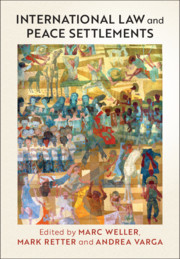Book contents
- International Law and Peace Settlements
- International Law and Peace Settlements
- Copyright page
- Contents
- Contributors
- Preface and Acknowledgements
- Case Law
- Peace Agreements and Instruments
- Abbreviations
- 1 Introduction
- Part I Historical Dimensions to Peace Settlement Practice
- Part II Peace Agreements As Legal Instruments
- Part III Key Actors and the Role of International Law
- Part IV Representation, Sovereignty and Governance
- Part V Economic Aspects of Peace Settlements
- Part VI Humanitarian Obligations and Human Rights
- 25 Negotiating the International Legal Fate of Detainees
- 26 Accountability
- 27 The Return of People and Property
- 28 Peace Settlements and Human Rights
- Conclusion
- Index
28 - Peace Settlements and Human Rights
from Part VI - Humanitarian Obligations and Human Rights
Published online by Cambridge University Press: 14 January 2021
- International Law and Peace Settlements
- International Law and Peace Settlements
- Copyright page
- Contents
- Contributors
- Preface and Acknowledgements
- Case Law
- Peace Agreements and Instruments
- Abbreviations
- 1 Introduction
- Part I Historical Dimensions to Peace Settlement Practice
- Part II Peace Agreements As Legal Instruments
- Part III Key Actors and the Role of International Law
- Part IV Representation, Sovereignty and Governance
- Part V Economic Aspects of Peace Settlements
- Part VI Humanitarian Obligations and Human Rights
- 25 Negotiating the International Legal Fate of Detainees
- 26 Accountability
- 27 The Return of People and Property
- 28 Peace Settlements and Human Rights
- Conclusion
- Index
Summary
In the context of a difficult transition from war to peace, arrangements aimed at achieving peace (such as power-sharing, including autonomy) may come into tension with human rights (such as non-discrimination or indigenous rights). When this happens, peace and human rights are often unhelpfully characterized as binary or even mutually exclusive. The aim of this chapter is to query this binary characterisation, using three case studies where a particular tension was contested before a court: Bosnia and Herzegovina, the Philippines and El Salvador. The chapter shows that since neither peace, nor (most) human rights are absolute, it is possible to weigh the two against each other; and the tension can be framed in a way that is more conducive to its resolution, by conceptualising peace as a fundamental public purpose, a legitimate aim, and/or a human right, thus internalising it in human rights reasoning, rather than treating it as external.
- Type
- Chapter
- Information
- International Law and Peace Settlements , pp. 655 - 682Publisher: Cambridge University PressPrint publication year: 2021
- 1
- Cited by



